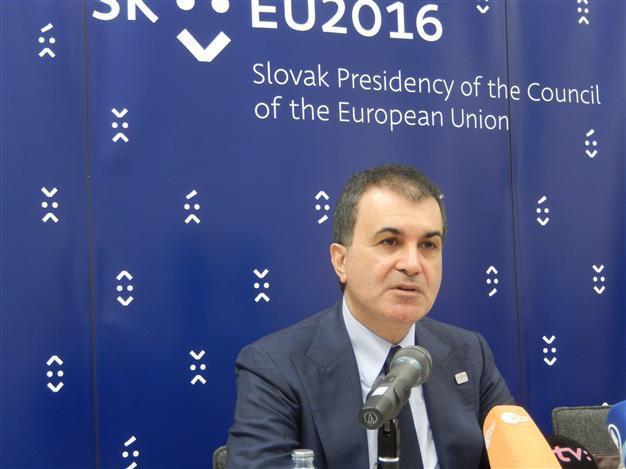Turkish minister announces ‘very strong consensus’ with EU
BRATISLAVA

'There is very strong consensus about focusing on a positive agenda and further enhancing cooperation between Turkey and the EU,' says Minister Çelik. AA photo
Turkey’s European Union minister and chief negotiator with the bloc, Ömer Çelik, said on Sept. 3 that his meeting with the bloc’s 28 foreign ministers had resulted in a “very strong consensus” that they should work more closely after ties soured.Çelik expressed Turkey’s strong disappointment with the EU’s initial reaction to the failed coup attempt on July 15.
“As a result of the meeting, there is very strong consensus about focusing on a positive agenda and further enhancing cooperation between Turkey and the EU,” Çelik told reporters after his talks with EU ministers on Sept. 3 in Bratislava.
Çelik told journalists that Turkey would “continue to implement” the migrant deal reached in March with the EU even if its demands on visa liberalization were not met. At the same time, he warned that without a visa deal, Ankara would not be part of any new arrangement to manage what he said were expectations of a greater migrant influx in the future.
“The [migrant] mechanism will not be enough... so we need a new mechanism,” he said. “And if [there is] no liberalization, Turkey will not be very positive in setting up a new mechanism.”
In exchange for its help to curb the flow of migrants into the bloc, Turkey expects visa-free travel inside the EU’s Schengen zone for its citizens, which the EU says it can grant only after Turkey fulfills all of the 72 criteria, which also includes an amendment to Turkey’s anti-terror law.
Çelik said that the current security situation meant it was not realistic to expect the Turkish government to relax its anti-terror laws now, as required by the EU.
‘Talk more with each other’
He did not rule out, however, it could be done in the future and said Ankara was ready for talks on that with the Council of Europe, a European human rights body of which Turkey is a member.
Çelik said the EU should move ahead on visa liberalization but Federica Mogherini, the EU’s top foreign policy official, suggested that would only happen if Turkey met existing EU “benchmarks” on human rights.
“The main message all shared is first of all, the strong recommitment to dialogue; that we talk less about each and more with each other,” Mogherini told a press conference at the end of the two-day foreign ministers meeting.
“We agreed that all previous agreements will be respected, be it on visa liberalization, the Customs Union, the management of refugee flows... all tracks will continue,” she said.
Meanwhile, German newspaper Welt am Sonntag said on Sept. 4 that Turkey was now willing to accept the liberalization of travel visa rules by the end of the year instead of October, as previously targeted, citing senior Turkish government sources.
Ankara had previously threatened to walk away from an EU migrant deal should it not get more relaxed travel rules in October.
Welt am Sonntag quoted senior Turkish officials familiar with the EU talks as saying that a delay until November or December was now seen as acceptable. However, Turkish officials were still insisting on securing visa liberalization “no later than the end of the year,” the newspaper said, according to Reuters.
Europe ‘close to limits’ on refugee influx: Tusk
On Sept. 4, EU President Donald Tusk said Europe was “close to limits” on its ability to accept new waves of refugees, urging the broader international community to shoulder its share of the burden.
“The practical capability of Europe to host new waves of refugees, not to mention irregular economic migrants, is close to limits,” he told a press conference on the sidelines of the G-20 summit in China’s Hangzhou.
At the same time, he said that because Turkey was an EU candidate country, it is expected to live up to EU values, citing rule of law, media freedom “and of course the death penalty.”
Turkish President Recep Tayyip Erdoğan had voiced reintroducing the death penalty into Turkey’s legal system after the coup attempt, during which more than 250 people were killed, on grounds the nation wanted it.
Luxembourg Foreign Minister Jean Asselborn told Reuters after the EU ministers’ meeting with Çelik that a rapprochement with Turkey was needed.
“On the political level we need a rapprochement, we need to normalize the situation,” said Asselborn.
“It’s the first time since the coup that we spoke to each other, not about one another. But we cannot forget the rule of law. Everyone around the table said that if they want to stabilize the situation, they must come back to the rule of law as quickly as possible.”
Turkish FM ‘to meet with CoE’ next week
Speaking after the meeting in Bratislava, German Foreign Minister Frank-Walter Steinmeier said Turkish counterpart Mevlüt Çavuşoğlu would travel to Strasbourg next week to discuss the Council of Europe’s role in preparing post-coup prosecutions in Turkey.
Steinmeier also told reporters that Germany stood by Turkey after the coup attempt and had high respect for the Turkish people who rose up to put down the plot.
He acknowledged German statements had perhaps lacked the empathy that Ankara expected.
















